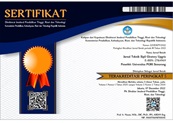EFEKTIVITAS PELAYANAN BUS RAPID TRANSIT (BRT) TRANS SEMARANG (KORIDOR MANGKANG-PENGGARON)
Mukhamad Ilham Ainun Nahar, Muhammad Ali Assehab, Ibnu Toto Husodo, Mohammad Debby Rizani
Abstract
Many people still use private vehicles, making BRT's function as a solution to overcome congestion not optimally realized. The aims of this study were: 1) to determine the supporting and inhibiting factors for the Trans Semarang Bus Rapid Transit (BRT) service (Mangkang-Penggaron Corridor); 2) determine the effectiveness of the Trans Semarang Bus Rapid Transit (BRT) service (Mangkang-Penggaron Corridor). This research uses a quantitative approach. Data collection techniques are observation, interviews, and documentation. Data analysis technique is descriptive statistics. The research results show that the supporting factors for the BRT Trans Semarang service are the dominant flat and wide roads, so that large buses can be used. The inhibiting factors in BRT Trans Semarang services are the absence of a special lane for BRT Trans Semarang, so waiting times and fleet intervals are still very dependent on existing traffic conditions. How to overcome the inhibiting factors in BRT Trans Semarang services, namely planning a special route for the Jrakah intersection to the Pedurungan intersection with a length of 12.8 km to improve service and reduce passenger waiting time, as well as improve fleet intervals. While the effectiveness of BRT Trans Semarang service corridor I Mangkang-Penggaron obtained a total average percentage value of 84% in the very good category. The results of the one sample t-test that have been carried out obtained a sig 2-tailed value of 0.000 <0.05, indicating that Ho was rejected, so the average value of the effectiveness of the Trans Semarang Bus Rapid Transit (BRT) service corridor I Mangkang-Penggaron is not the same with 80. It can be concluded that the effectiveness of the Trans Semarang Bus Rapid Transit (BRT) service (Mangkang-Penggaron Corridor) has been running effectively.
Keywords
Effectiveness, Service; Bus Rapid Transit (BRT) Trans Semarang
References
Hasugian, Fitri Yanti. 2020. Analisis Tingkat Efektivitas Trans Medan-Binjai-Deli Serdang (MEBIDANG) Sebagai Transportasi Publik Dalam Mengurangi Kemacetan di Kota Medan. Skripsi. Medan: Universitas Sumatera Utara.
Sugiyono, 2013. Metode Penelitian Pendidikan (Pendekatan Kuantitatif, Kualitatif, dan R&D). Bandung: Alfabeta.
Sukmadinata, Nana Syaodih. 2013. Metode Penelitian Pendidikan. Bandung: PT. Remaja Rosdakarya.
Wau, Resty Nawati. 2020. Efektivitas Program Trans Mebidang Dalam Meningkatkan Pelayanan Transportasi Massal di Kota Medan. Skripsi. Medan: Universitas Muhammadiyah Sumatera Utara.
________. Keputusan Menteri Pendayagunaan Aparatur Negara No. 63 Tahun 2003 Tentang Pedoman Umum Penyelenggaraan Pelayanan Publik.
DOI:
https://doi.org/10.26877/giratory.v5i2.21966
Refbacks
- There are currently no refbacks.

This work is licensed under a
Creative Commons Attribution-ShareAlike 4.0 International License.
Jurnal Teknik Sipil Giratory UPGRIS
Program Studi Teknik Sipil
Fakultas Teknik dan Informatika
Universitas PGRI Semarang




